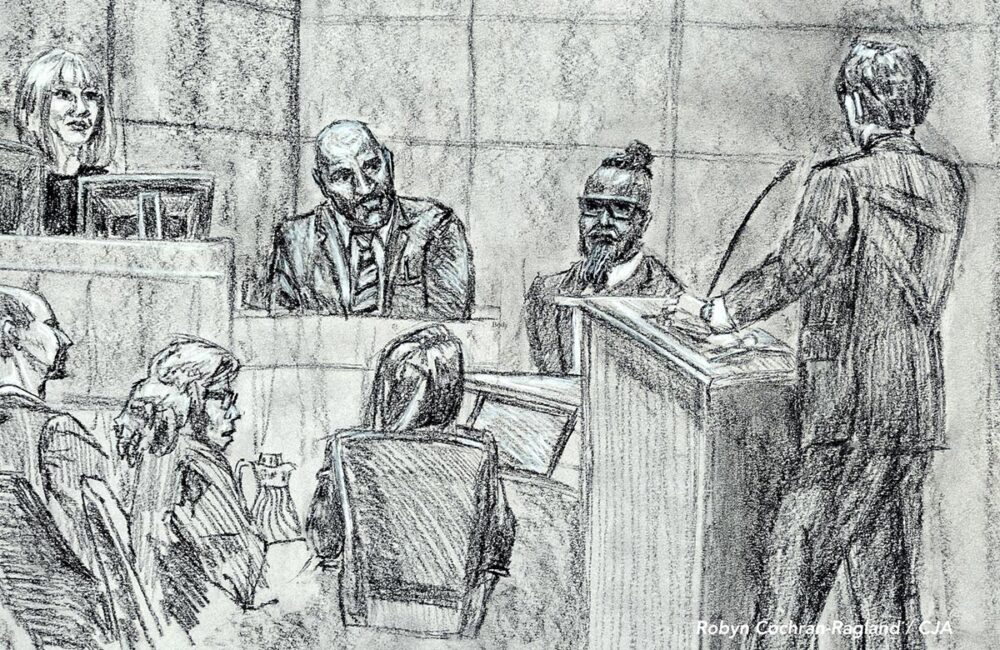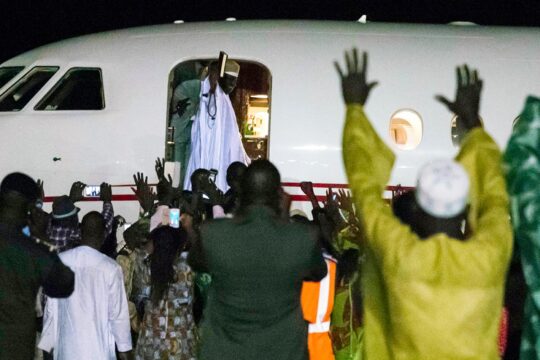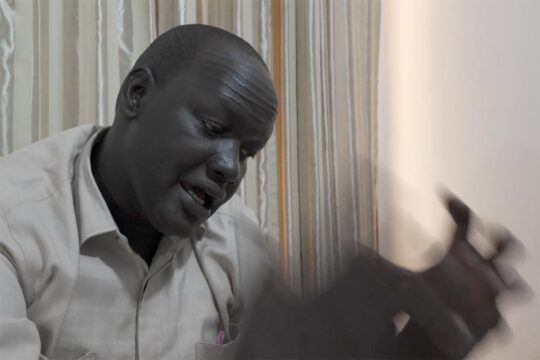“The defendant is not on trial because he arrested people. The defendant is on trial based on how he and other Junglers treated, tortured them. People have choices. Junglers had choices. The defendant is on trial based on the choices he made,” prosecutor Marie Zisa told the jury on April 8.
Witness hearings in the trial of Michael Sang Correa for torture and conspiracy to commit torture commenced on Tuesday in Denver, United States, after a day for jury selection. Correa is prosecuted as a former ‘Jungler’, a hit-squad under Gambia’s president Yahya Jammeh (1994-2017). He is accused of having tortured several individuals allegedly involved in a coup attempt in Gambia in 2006.
In Judge Christine Aguellor’s courtroom, the defence attorneys were seated on the left side of the room and the prosecution on the right, each team around a circular table. The defence team sat across from the Gambians who travelled to Denver to observe the trial, including members of Gambian civil society. Although a majority of them, including an alleged victim who is not a witness in this trial, have been advocating for Correa to be brought to justice, in a trial taking place thousands miles away from home, they appear to be the accused’s closest peers.
The defendant, who turned 46 the day his trial opened, walked towards his counsels smiling, smartly dressed in a black suit with a white shirt underneath. Unrecognisable to many of the Gambians in the room, he now keeps a beard which looks like it’s been dyed in the middle, high-top dreadlocks in a ponytail and neatly shaved sides.
“President Jammeh instructed personnel of his security forces involving Junglers and NIA [National Intelligence Agency] to torture the victims. The NIA and the Junglers agreed to commit this torture. In particular the defendant and others [brought] these coup plotters to the NIA,” continued Zisa. There, they were questioned by a panel. “You say what the panel wants you to say, or face the wrath of the Junglers. The confessions were then used against the victims.” According to the prosecution, Correa was a willing participant. “The victims will not forget. The victims do not forget him.”
A ‘coercion and under duress’ defence
The defence argument is that Correa committed the crimes because he feared for his life and safety. It sets to establish that he was forced to participate in the torture of his victims. Correa’s lawyers cited Musa Jammeh, Tumbul Tamba and Manlafi Corr as examples of Junglers who were close to Jammeh but later killed by him when suspected of being part of a plot.
“Junglers had to carry out Yahya Jammeh’s orders without question. [By] 2010, many Junglers were arrested, tortured. And we see where he [Correa] fits: he was at the bottom. You will hear that they were ordered to go to the Junglers. It [was] not a choice,” defence attorney Jared Westbroek argued. “There is no conspiracy,” he said, referring to one of the charges against his client. “You cannot have an agreement when you did not have choices.”
“Mr Jammeh knew what you did and he will have his State Guard pick you up. Everybody knew that this was what was going to happen to you. Mr Correa knew what was going to happen to him because this is what happened to other Junglers. In the end, we will ask you to find Mr Correa not guilty because he was coerced, he was under duress,” Westbroek said. He stressed that the defendant was only a private in the army. “Jammeh was the law.”
Junglers who refused to torture
Major Yahya Darboe, the prosecution’s third witness, didn’t agree with this explanation. He told the court that during his torture, Junglers Malick Jatta and Bora Colley refused to participate and he was not aware of anything happening to them as a result. Darboe was an adjutant to the commanding officer of Yundum Barracks, a military camp near Banjul, Gambia’s capital city, at the time of the 2006 coup attempt. He was approached by Major Wassa Camara about the coup. Darboe’s role was to get the support of soldiers in his battalion and also control the airport.
After the foiled coup attempt, he was arrested at his house and taken to Mile 2 prison, the main and most infamous detention center in the country. Darboe recalled being taken to the NIA at least four times, where he was tortured by the Junglers, leading to lifelong injuries and suffering. Darboe was hit in the left eye at the NIA and pictures of scars left behind by melted plastic bags on his skin were exhibited in court. He was not free from the Junglers’ tortures even after they forced a confession out of him.
He identified Correa, Dembo Jarju and Sanna Manjang as the Junglers who participated most in the tortures. “These are terrible people,” he said. “He [referring to Correa] was more aggressive. I could not believe it was the Michael Correa that I knew before.” (Correa had worked under his command in 2004 at the Yundum Barracks.)
“During those times you were at the NIA, did you see the Junglers being ordered?” prosecutor Laura Cramer-Babycz asked. The witness responded in the affirmative, stating that Musa Jammeh, the principal protection officer to Yahya Jammeh, was giving them orders.
One charge less
The trial commenced with some relief for the defense. On the first day the court dismissed one of the charges against Correa because Bunja Darboe, one of the witnesses in the indictment, will not be available to testify. At the time of the 2006 coup, Lieutenant Colonel Darboe was the military assistant to Ndure Cham, the then Chief of Defense Staff who spearheaded the coup. Following his gruesome torture by the Junglers – including Correa, according to him – he was made to read a false statement on national television, implicating himself in the coup.
Darboe was a witness in the trial of Gambia’s former interior minister Ousman Sonko that took place in Switzerland in 2024. He had testified against Sonko for his involvement in his victimisation following the March 2006 coup, which is one of the crimes Sonko has been convicted for. But according to the Gambian authorities, Darboe, who is still on active duty in the military, will not be able to appear in Correa’s trial because he has been deployed to another country. As a result this particular charge of torture was dismissed by the court.







